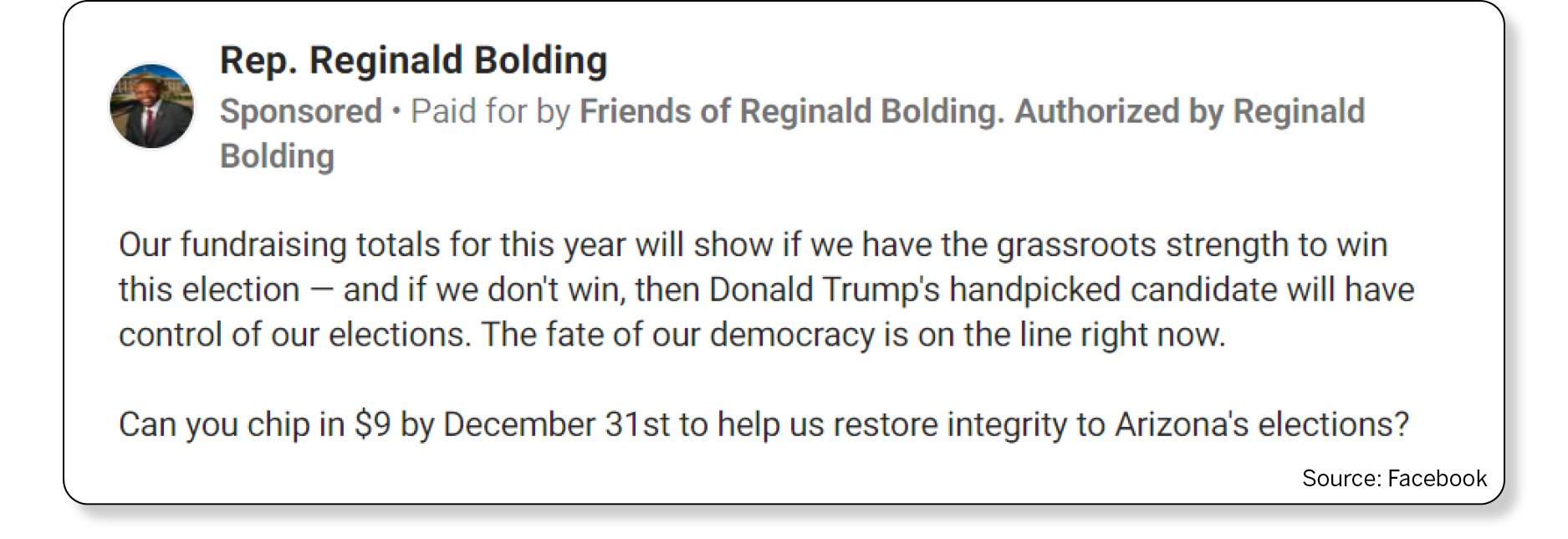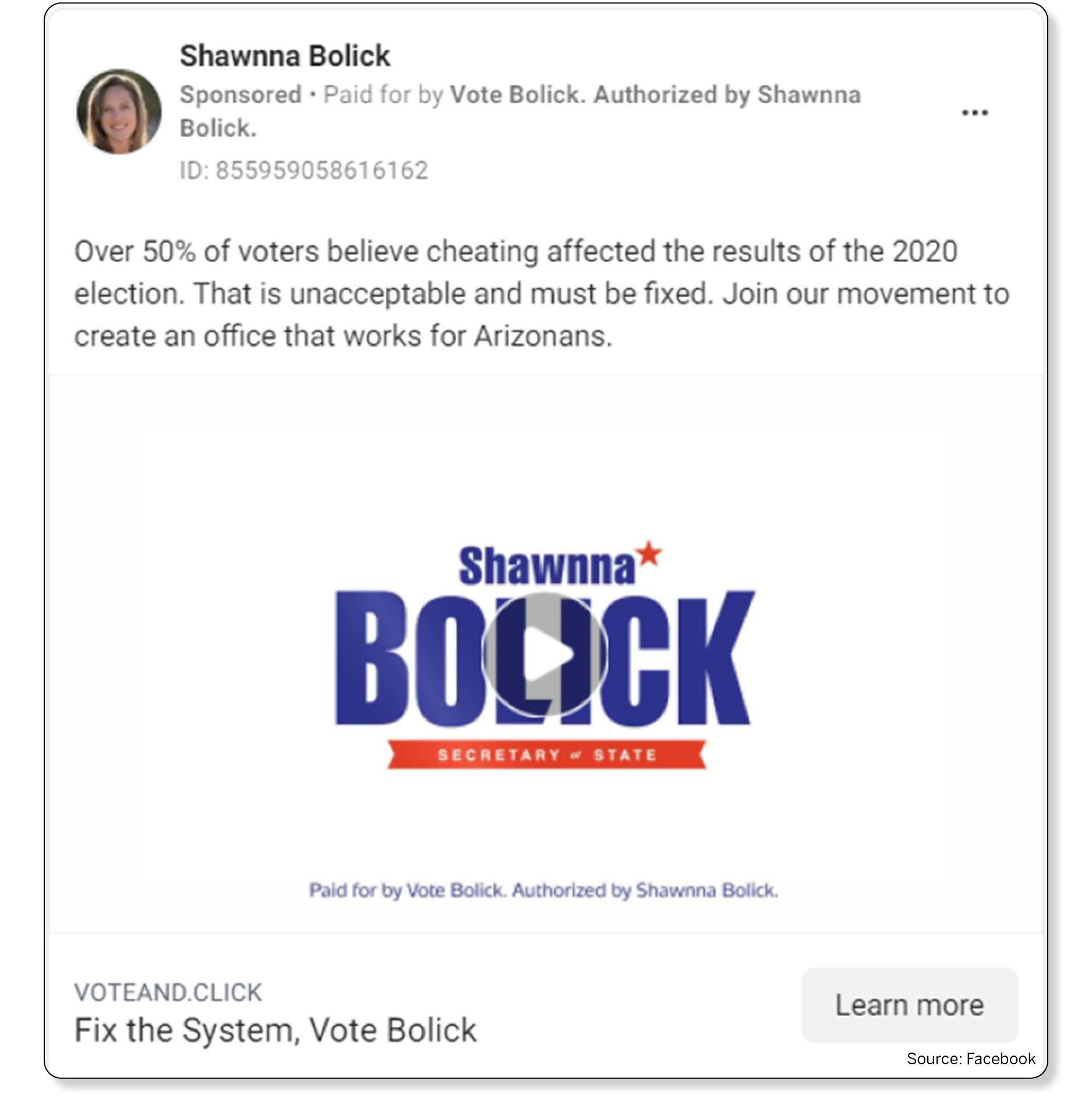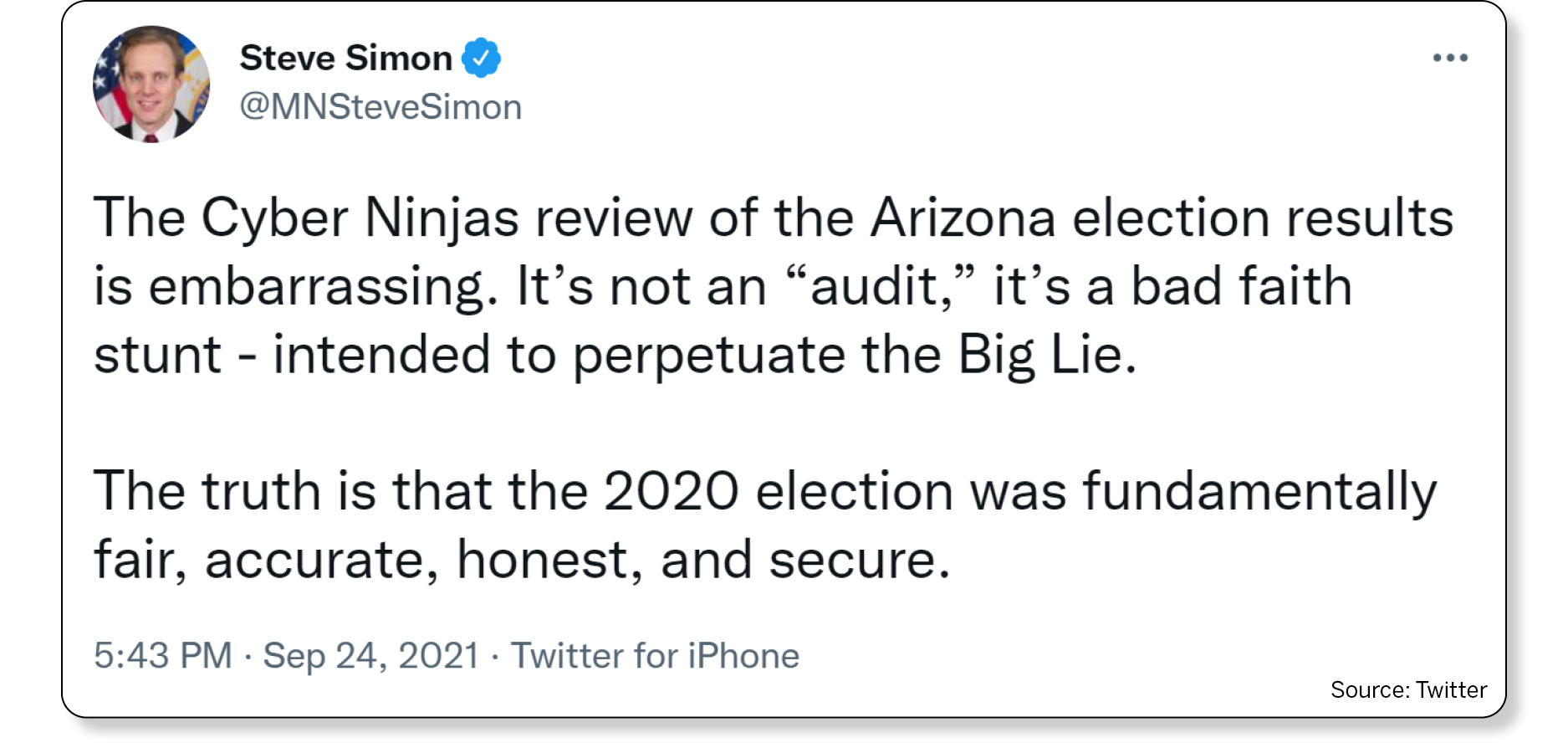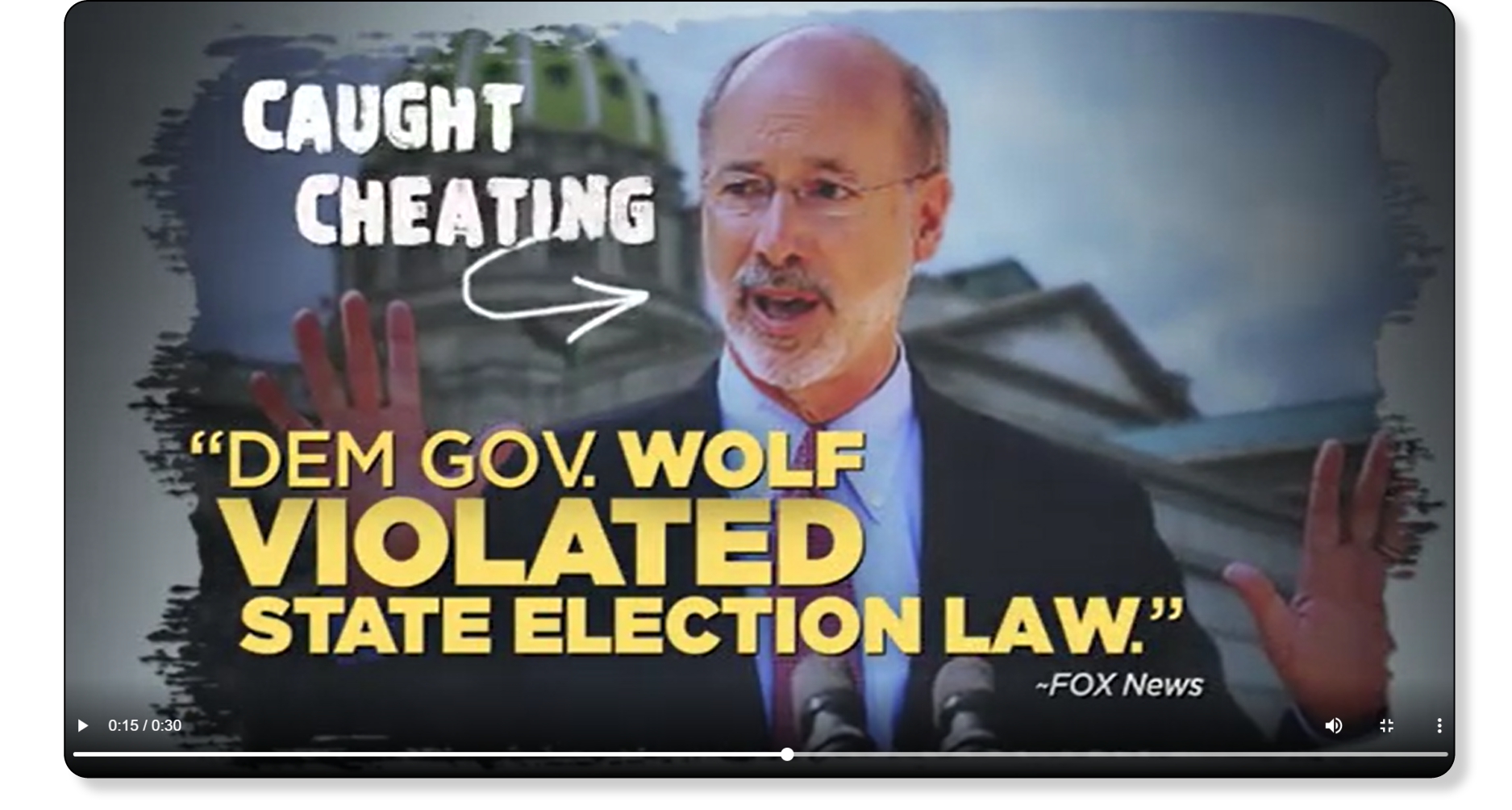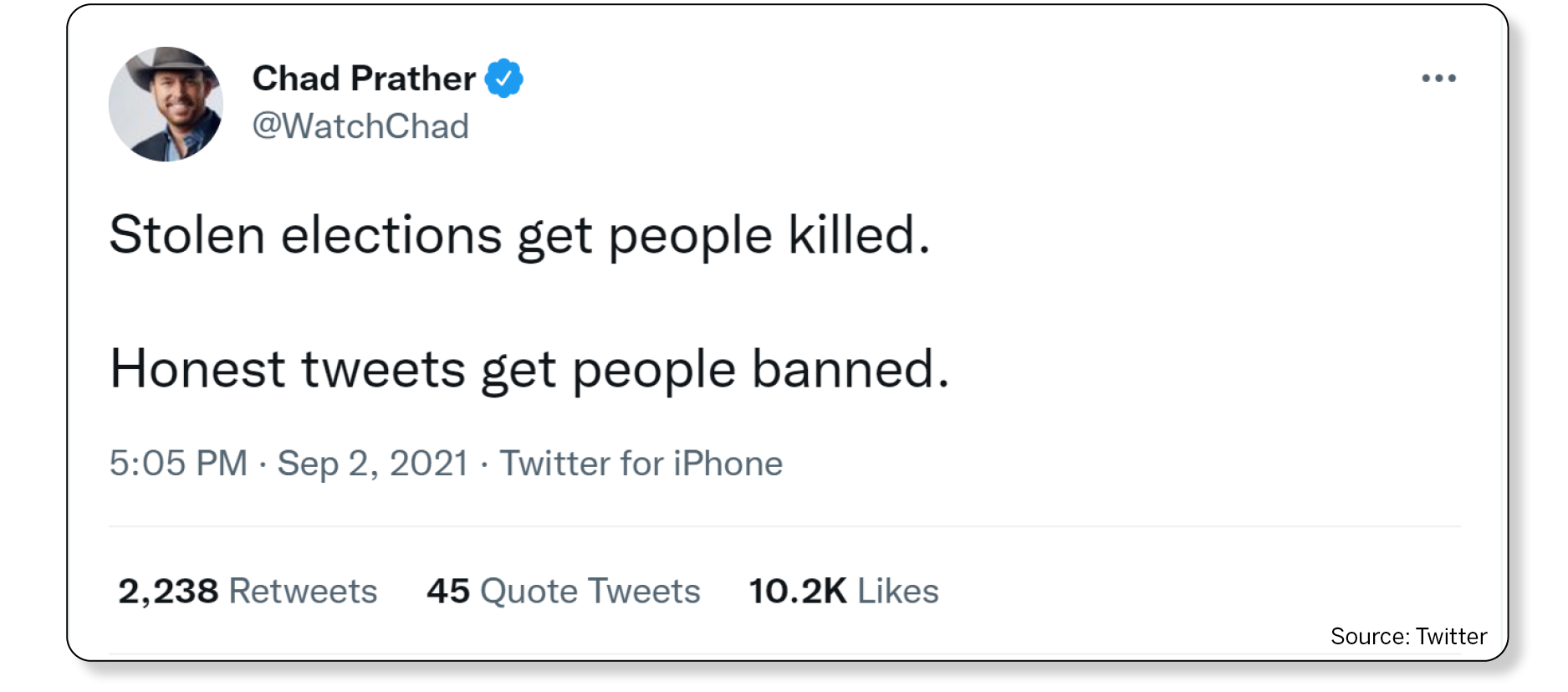In all six of the battleground states with secretary of state elections — Arizona, Georgia, Michigan, Minnesota, Nevada, and Wisconsin — fundraising for 2022 is at its highest level since 2010.*
Although our analysis is focused on contributions given directly to candidates, party-aligned groups that are active in multiple states have also seen record-setting donations. The Democratic Association of Secretaries of State raised $2.4 million last year, three-and-a-half times its next highest revenue for a non-election year, and more than even its best election year, which was $1.8 million in 2020. Republicans do not have a direct counterpart, but the Republican State Leadership Committee, which spends in secretary of state races as well as state legislative and judicial races, also took in a record high amount for a non-election year, $26.4 million.
Arizona
Secretary of State
Fundraising for the 2022 secretary of state race in Arizona is more than double the level at this point in the prior cycle and is more than eight times that of the 2014 cycle. So far four candidates have outraised what the 2018 winner, Katie Hobbs (D), had at this point. Hobbs was not the fundraising leader then, but both candidates that were ahead of her went on to lose their primaries. The number of donors in this year’s secretary of state election, 11,566, is higher than that of recent cycles by a factor of 10.
Two of the 2022 candidates are head and shoulders above the rest in contributions: advertising executive Beau Lane (R) ($714,000) and State Rep. Mark Finchem ($663,000). Lane has relied on large donations from just 410 donors. Finchem, who has said that “Trump won” and called for “decertifying” the election, has attracted a huge number of donors: 7,516. By comparison, only 1,235 people gave to all the Arizona secretary of state candidates combined in 2018.
A distant second in the number of donors is former Maricopa County Recorder Adrian Fontes (D), who raised $385,000 from 1,968 contributors. Fontes faced attacks for a plan to send every voter in his county a mail ballot in 2020 and criticized the state senate’s partisan review.
Finchem has, far and away, the most out-of-state donors in the race: two-thirds of the 7,516 donors to his campaign live outside of Arizona. State Rep. Reginald Bolding (D) — who has raised alarm about election denial in ads by saying, “The fate of our democracy is on the line right now” — has the next greatest reliance on out-of-state donors, with 54 percent of his 1,390 donors from other states. Lane, Fontes, and state Rep. Shawnna Bolick (R) all saw 80 to 90 percent of their donors living in Arizona.
Finchem and Bolding’s out-of-state fundraising successes are like nothing Arizona has seen in recent years. The amount that donors from other states have contributed is almost 10 times more than in the 2018 cycle and over 30 times more than in either the 2014 or 2010 cycle.
So far in this open-seat race, contributions to Republicans, at $1.6 million, are more than double the amount given to Democrats, $700,000. This is driven by the facts that the two candidates dominating fundraising are both Republicans, and the GOP also has a larger number of competitive candidates in its primary.
Issue Advertising
Outside spenders — those other than the candidates themselves — often focus messages on issues that are prominent in an election to help one side or the other. This spending, which can come from super PACs, dark money groups, or others, is usually concentrated in the final weeks before voters head to the polls. Even though it is still early, there has already been some outside spending in Arizona focused on the issue of election denial. These messages, and future ads in this vein, could impact races for election administration posts.
For instance, Opportunity Arizona, a national nonprofit advocacy group, has spent an estimated $573,000 on ads criticizing Gov. Doug Ducey (R), who is term-limited, over the Maricopa partisan review and attempts to change mail voting laws. Another national group, Defending Democracy Together, bought TV ads that feature Republican local officials from Arizona saying the result of the ballot review by the company Cyber Ninjas was to “desecrate our democracy” and calling for Republicans to stop lying about the election. In a potential indication of further plans in the state, the same group put out an ad in late January attacking gubernatorial candidate Kari Lake (R) as an “enemy of democracy” for her stance that Trump won the election and that she would not have certified the 2020 election.
Georgia
The amount of money flowing into the Georgia secretary of state election is four times higher than it was at this point in 2018 and 30 times higher than in 2014. U.S. Rep. Jody Hice, who has said if 2020 was a “fair election, it would be a different outcome,” has a strong lead with $1.6 million. Hice has raised twice as much as the incumbent he is challenging in the Republican primary, Brad Raffensperger, who has collected $705,000.
The fundraising leader among the Democrats, State Rep. Bee Nguyen, who has said she fears “a secretary of state who is anti-democratic and refuses to certify the results of the election,” has raised $1.1 million. All three of these leading fundraisers have blown far past the highest amount raised at this point in any of the last four cycles, which was Brian Kemp’s (R) $388,000 in 2010.
In a sign of intense national interest in the race, the combined contributions from outside of Georgia to the two leading fundraisers in this election have already topped the total amount of out-of-state donations to all the Georgia secretary of state candidates for the whole 2018 cycle. Hice has raised $420,000 from other states, and Nguyen $308,000. In the 2018 cycle, the race saw $675,000 from outside Georgia, the vast majority of which went to former U.S. Rep. John Barrow (D). Out-of-state contributions in the 2014 cycle totaled less than $30,000.
Across all the candidates in the 2022 race, Republicans have the fundraising advantage, with a total of $2.7 million going to those vying for the nomination, including the incumbent. The Democratic candidates together have raised $1.6 million.
Michigan
Fundraising in the Michigan secretary of state race is three times higher than at this point in the last election cycle. This is driven largely by incumbent Secretary of State Jocelyn Benson, who has raised $1.5 million as of December 31. With another 10 months until the election, that is almost as much as the $1.6 million Benson raised for the entire 2018 cycle. Benson, who has said that the “Big Lie is . . . about planting seeds to overturn the next” election, has amassed 4,890 donors this cycle. That is three times more than the number of donors to all Michigan secretary of state candidates combined by this point in 2018.
Kristina Karamo comes in a distant second in fundraising, with $233,000. More than 2,000 donors have supported Karamo, who claims that Trump won the election. Although that is a much small number than Benson’s, it is still more than the total number of donors in the secretary of state election by the same point in the last cycle.
None of the candidates opposing Karamo in the Republican primary has raised a significant sum.
The fundraising successes of Benson and Karamo have driven massive increases in the number of donors in the contest, as well as donations from people who live outside of Michigan. Overall, 7,142 people have given to a secretary of state candidate this cycle, virtually all of them to either Benson or Karamo. That is almost five times the number of contributions given to all candidates in 2018 and over six times more than in 2010 or 2014 (all these comparisons are to December of the year before the election). Out-of-state money has surged, by similar proportions, to $475,000 so far this cycle.
Minnesota
In Minnesota, contributions to secretary of state candidates are more than four times those to this point in the 2018 cycle and double those in 2014. As in other states, the incumbent has a strong fundraising lead. Secretary of State Steve Simon’s (D) haul is more than six times the combined fundraising of both candidates in the Republican primary. Simon has raised more through December than he took in for the entire 2018 cycle (he was also the incumbent in that election).
Nevada
The $911,000 flowing into the Nevada secretary of state race is far higher than in recent cycles. In this year’s race, Cisco Aguilar (D), an attorney and former staffer to U.S. Sen. Harry Reid, is the fundraising leader with $486,000. Second is Republican former State Rep. Jim Marchant — who said if he were secretary of state in 2020 he would have refused to certify Biden’s win — has amassed $136,000. (Note: Nevada data updated on February 16 with additional candidates and fundraising totals)
Wisconsin
In Wisconsin, the secretary of state does not administer elections and in fact has little authority of any kind. The Wisconsin Elections Commission, like elections administrators in many states, has been attacked over the 2020 elections. There has been a push, including by several declared candidates for secretary of state or governor, to give the secretary of state greater power over elections.
The incumbent, Secretary of State Doug LaFollette (D), has been in office continuously since 1983, in addition to a term in the 1970s. Early contributions have been essentially nonexistent in recent elections, but in this cycle Amy Loudenbeck (R) has almost singlehandedly driven fundraising to $75,000. Loudenbeck is a six-term member of the state assembly who sits on the powerful Joint Finance Committee, and her experience fundraising for legislative campaigns has likely given her a boost in this race. She is campaigning on giving the secretary of state more power, saying that an elected official should act as a “check” on the appointed Wisconsin Election Commission.



